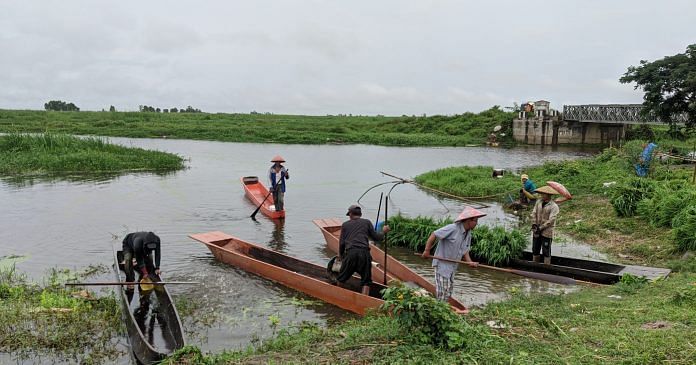Champu Khangpok (Bishnupur): Forty nine-year-old Khwairakpam Deven Singh lives in a Manipur village that does not exist on government records, save the 2011 Census.
The Champu Khangpok village was struck off the electoral records in the 1980s; years later its residents were declared encroachers, a tag they continue to hold to this day.
But Champu Khangpok is no ordinary village. It may not be present on paper but it continues to float — quite literally.
Deven Singh and the 300 odd residents of this floating village live in temporary and fragile huts that do not rest on solid earth. They stand delicately on four to ten feet thick spongy mats of aquatic plants, organic debris and soil, called phumdis, in the middle of the largest freshwater lake in the Northeast Region, the Loktak Lake.
“In the late 1980s, the polling booth in Karang village (the nearest village) was closed without our knowledge and consent … Our voting rights were moved to the place of our relatives and other family members (in the surrounding areas),” said Deven from outside his 23 by 14 feet sized hut. Deven’s family has been in the floating village for two generations. Yet, there are no records of their existence here.
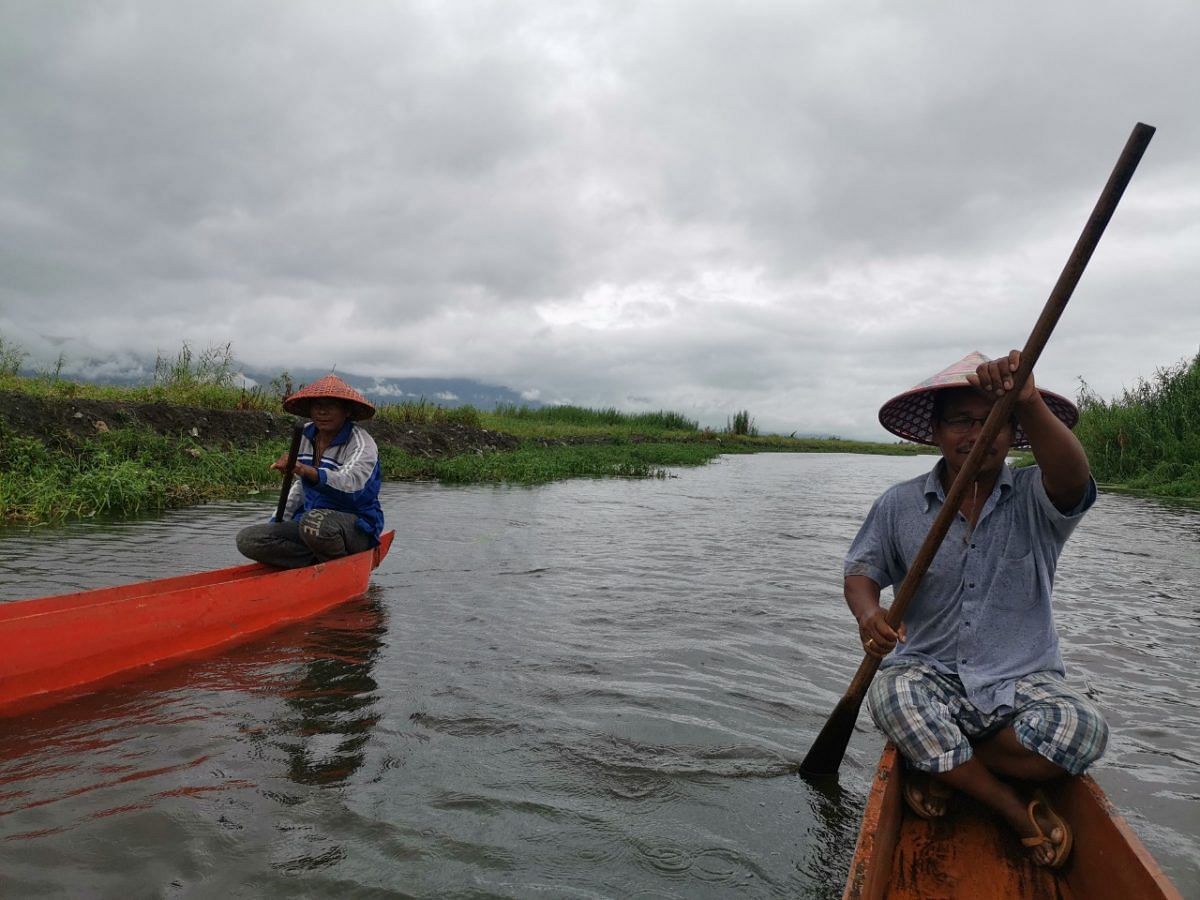
The troubles of their precarious existence have been compounded by the Covid-19 pandemic — from the lack of access to ration through the Public Distribution System (PDS) and healthcare to a space crunch, a problem unique to this ecosystem.
“Because of the Covid-19 pandemic, we are in a lot of trouble. We are not getting whatever the Prime Minister and the local MLA are giving … if they say today they will give PDS, it will only last for one or two days,” Deven said, adding, “On the shore, if someone runs out of salt in their houses, they can walk and get it even if no shops are open. But here if we don’t have salt, we have to go and come back for at least three hours.”
ThePrint contacted Loktak Development Authority director, Longjam Bhagaton, via phone but he didn’t wish to comment on the status of Covid-19 relief being provided to the villagers “since they are illegally residing in the lake as per the (Loktak Protection) Act”.
Also read: ‘Gang raped by boyfriend, others’, 14-yr-old Manipur girl dies after ‘elopement’ goes wrong
The Covid-19 troubles
For decades now, the 383 residents of the village have been living this transient life, staying afloat, navigating government apathy, the changing ecology of Loktak lake and the changing political-economy’s desire to turn their waters into a resource that everyone else, but they can harvest. Then came the Covid-19 pandemic, which has made them learn more acutely what it means to exist off the record.
For one, there is a lack of well-equipped public health centres in the area, which means that the villagers have to travel all the way to the district headquarters in Bishnupur — a journey which involves an hour-long boat ride and then a 30-minute-long car ride.
The only silver lining is that Champu Khangpok has remained Covid-19 free.
But the pandemic has exposed another major problem — lack of space. Unable to accommodate their children in the small huts, many of the residents send them out to the nearby cities such as Imphal for education.
“But now because of Covid-19, we have to bring back our children who are living in hostels and boarding schools. My house is 23 by 14 feet. How can 5-7 people live in it,” Deven rued.
Adding to their worries is the closure of the markets.
Among the Meiteis of Manipur, markets and trade have traditionally been handled by the women. It’s no different in Loktak Lake. Although fishing is primarily done by men, women are in charge of transporting the catch and selling it in the markets.
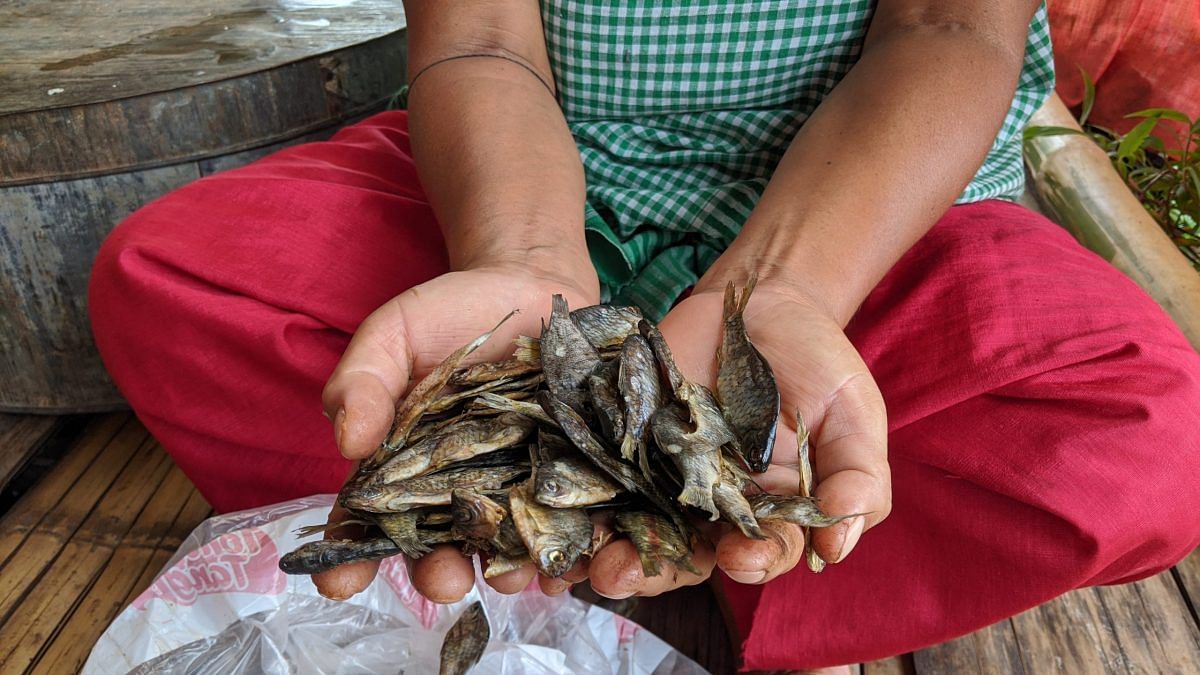
But for the last few months, these women have had little to do. “We used to go to Ningthoukhong (a town on the shore) to sell or even catch some fish there, but due to this lockdown, we have been restricted to sell at the community clubs and the people there,” said 46-year-old Ningthoujam Ungbi Thasana Devi.
“We sun-dry the fish and turn it into fermented fish and store them…We also have some dried fish but we cannot store them for long as it gets covered by fungus. So, we have been suffering,” she said.
A history of Loktak’s issues
Loktak Lake, which covers an area of 287 sq km, has played an integral role in the economy of Manipur. According to the study, Insight into the Socio-economic Life of Fishers of Loktak Lake, Manipur – A Ramsar Site, prior to the 1950s, the lake contributed to 60 per cent of the fish production of the state, which has dropped to 11 per cent in recent times.
About 12 lakh people of Manipur are said to be indirectly or directly dependent on the Loktak, which in the Meitei language means ‘where the streams end/meet’.
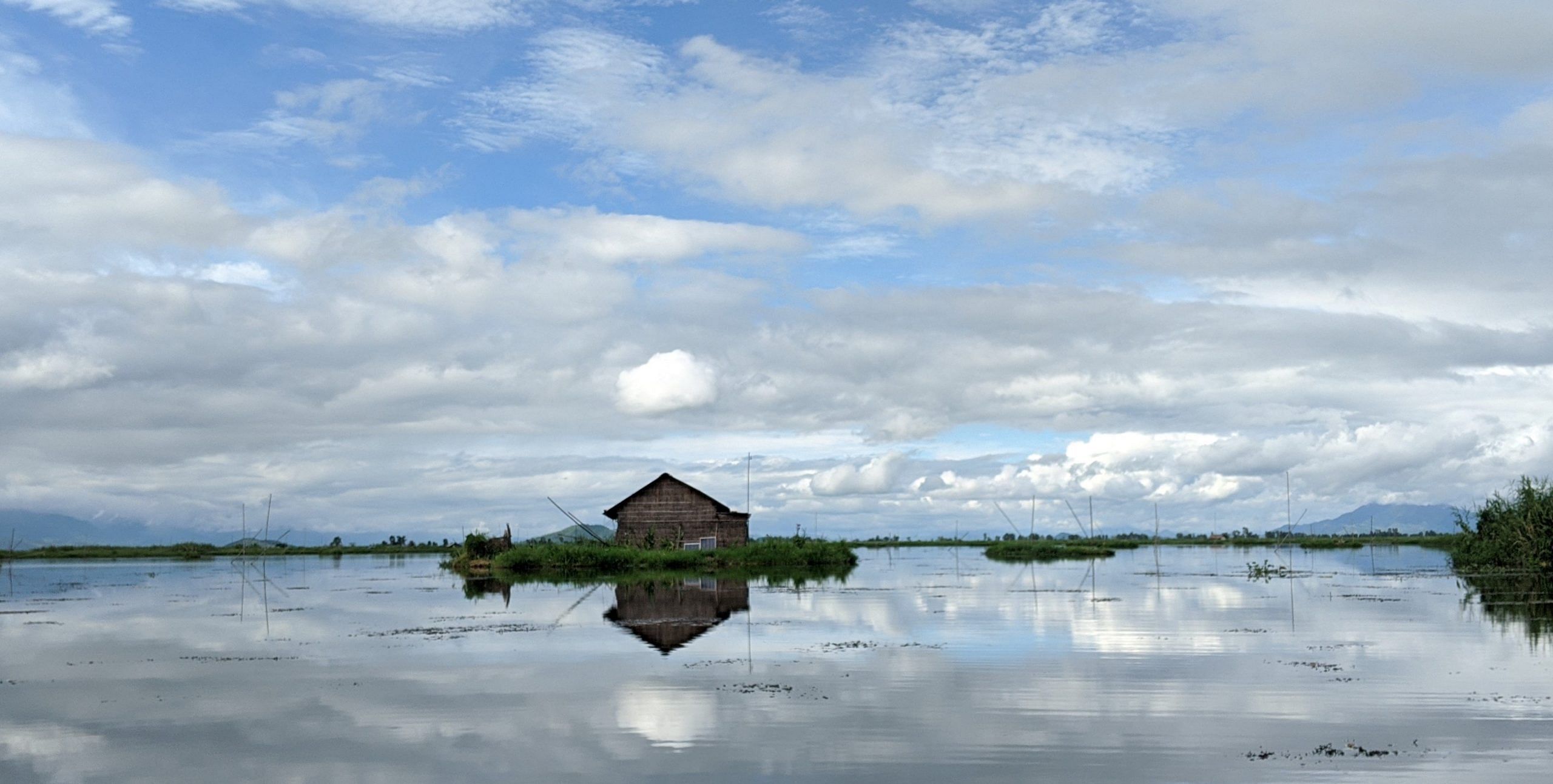
The lake is fed by eight rivers including the Imphal river. In 1990, it was declared a Ramsar site — a wetland of international importance under UNESCO. The lake, however, has been at the centre of many controversies.
Trouble started brewing back in 1983 with the commissioning of the Ithai barrage, which was constructed close to the confluence of the Imphal and Tuitha rivers to harness Loktak’s waters to generate hydropower.
“Before the commission of the Ithai barrage, it (the Loktak Lake) would dry up in the rainy season…during the summer we would cultivate and also catch fish. There wasn’t any lack of vegetation,” Deven said. The barrage ended up affecting the “hydrological regimen” of the water. As a result, the water level of Loktak became more or less stagnant and the fishermen lost out on a source of income they would earn by cultivating the land.
‘Encroachers’ of Loktak
Three years later, in 1986, while residents of Loktak were adjusting to the drastic ecological changes, the state government constituted the Loktak Development Authority (LDA), “to check the deteriorating condition of Loktak Lake” and “bring about improvement of the lake ecosystem”. In 2006, the LDA enforced the Manipur Loktak Protection Act.
According to the Act, “no person shall without the previous approval of the Authority obtain any lake resources”. The Act also prohibits the setting up of a house or hut on a phumdi. Five years later, the LDA burned down about 777 of the more than 1,000 floating huts of the village.
Haobijam Kumar had been living in Champu Khangpok for 30 years before his house was allegedly burnt down on 13 November 2011.
“My family was outside on the lake for some work. We came back to find our house was all up in ash and smoke with everything that we ever had like fishing equipment, paper documents, books, clothes, etc were burnt,” said the 58-year-old, who is now a fisherman in the nearby Thanga village. “Life has been an endless struggle since then…(If I could) I would definitely like to go back and live again in Champu Khangpok.”
The Act hasn’t been struck down despite appeals from the civil society groups as well as the BJP back in 2011, when it was the opposition party in the then-Congress ruled state. Today, only 166 families continue living in Champu Khangpok.
A fight for livelihood
Fifty-year-old Houbijam Biramangol Singh is a second-generation fisherman who has been living and working in Champu Khangpok for 30 years now. As the polling booth at Karang island was removed, he was forced to register his voter ID, Aadhaar card, and ration cards to Thanga where his brother lives.
His day begins at 4 am, and he sets out of the house by 7:30 am to go and pick up the fishing nets suspended in the water overnight. The nets are reeled back in by 11 am and the fishermen return to process the fish, which typically involves smoke drying them — a delicacy in Manipur.
Biramangol Singh returns to the waters again late afternoon and stays in the waters until 9 pm after which he comes back in, cleans, and smoke-dries the new catch. It’s 17-18 hour days that yields anywhere between Rs 2,000 to Rs 15,000 a month. “Whatever our income from the work at Loktak is barely enough for our children’s education and also to support the family at the same time,” Singh said.
“We want the PDS items to be distributed here as it takes us one-and-a-half to two hours to go by boat and get the supplies from the nearest distribution spot,” he said.
Every month, the fishermen and their families wait for the local authorities to announce the availability of ration on the loudspeakers placed across different spots in the lake.
“Sometimes we get it but sometimes we don’t. If they announce it today that they will give the PDS from tomorrow, they will distribute it only for two days,” Deven said. “It’s 1.5-2 hours away. Also the information can be erratic and if we go after 2 days, they will tell us that the ration is over.”
Knocking on EC’s doors
Compelled by the plight of the village, the Champu Khangpok Floating Village Welfare Committee on 10 September submitted a letter to the chief electoral officer, Manipur, appealing for the enrolment of the 383 residents as voters of the village.
The letter mentions an RTI response, filed by one Pradip Chatterjee, which reveals that electoral rolls for the village were only available for 1988, 1989, and 1990.
“We are enlisted as voters in other villages even though we live in Champu Khangpok. Meaning that our legal existence at Champu Khangpok is not recognised but identified somewhere else,” the letter adds.
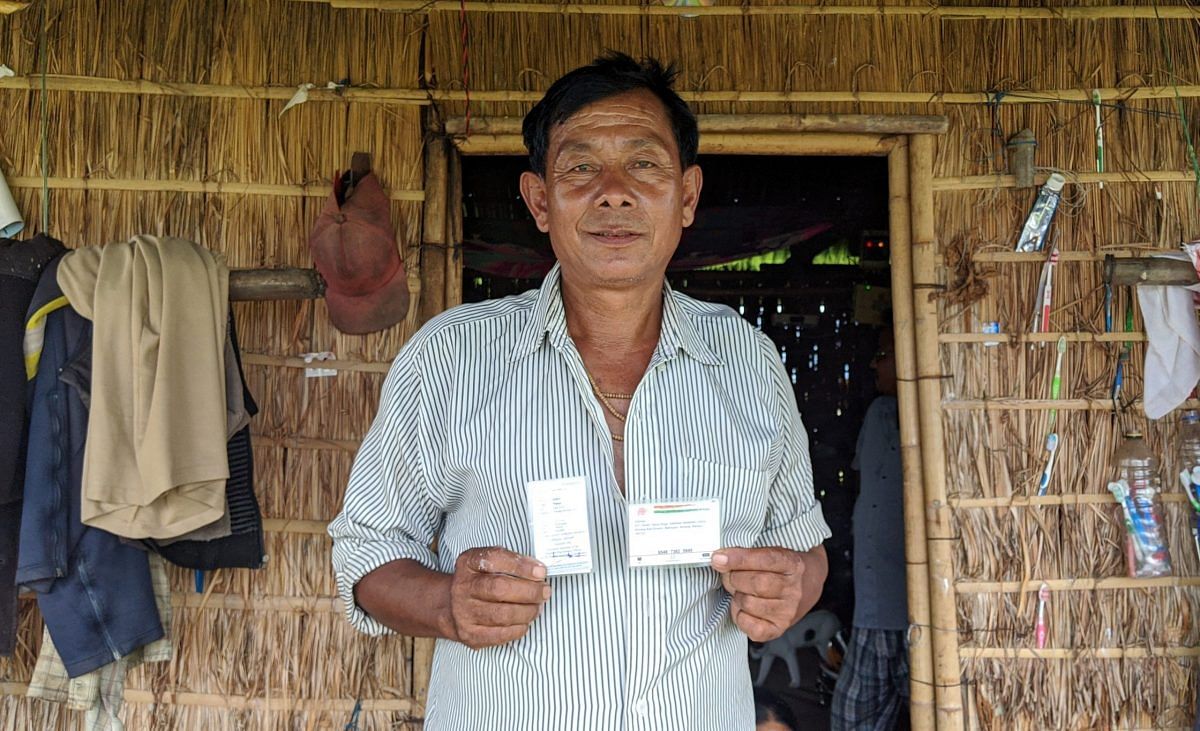
In a telephonic interview with ThePrint, Joint Chief Electoral Officer of Manipur Ramananda Nongmeikapam, to whom the welfare committee’s letter is addressed, said, “We have written to the deputy commissioner of that district (Bishnupur) to inquire (into this), to visit the particular area of the village.”
“When they ascertain saying that they are ordinary residents, then we will initiate action to get them enrolled in a particular polling station. We will create a polling station for them,” he added.
Responding to a question on whether the Loktak Protection Act 2006 will have a bearing on the decision, he said, “I’m not aware of other environmental acts, but we will act (based) on the Representation of Peoples Act… If they are citizens they should be given a voting right.”
“What was there before, should be revived. We should have voting rights in the place we are working in,” Deven Singh said.
This will, however, just be the start for the villagers of Champu Khangpok.
Since 2019, the people have also been battling with the Manipur government over their plans to develop an Inland Waterways Project in Loktak Lake that would lead to further deterioration. The pandemic is temporary but the Inland Waterways Project, the locals said, will forever alter their lives.
Also read: Somdal is a quiet, unassuming village in Manipur. Until you hear its history


